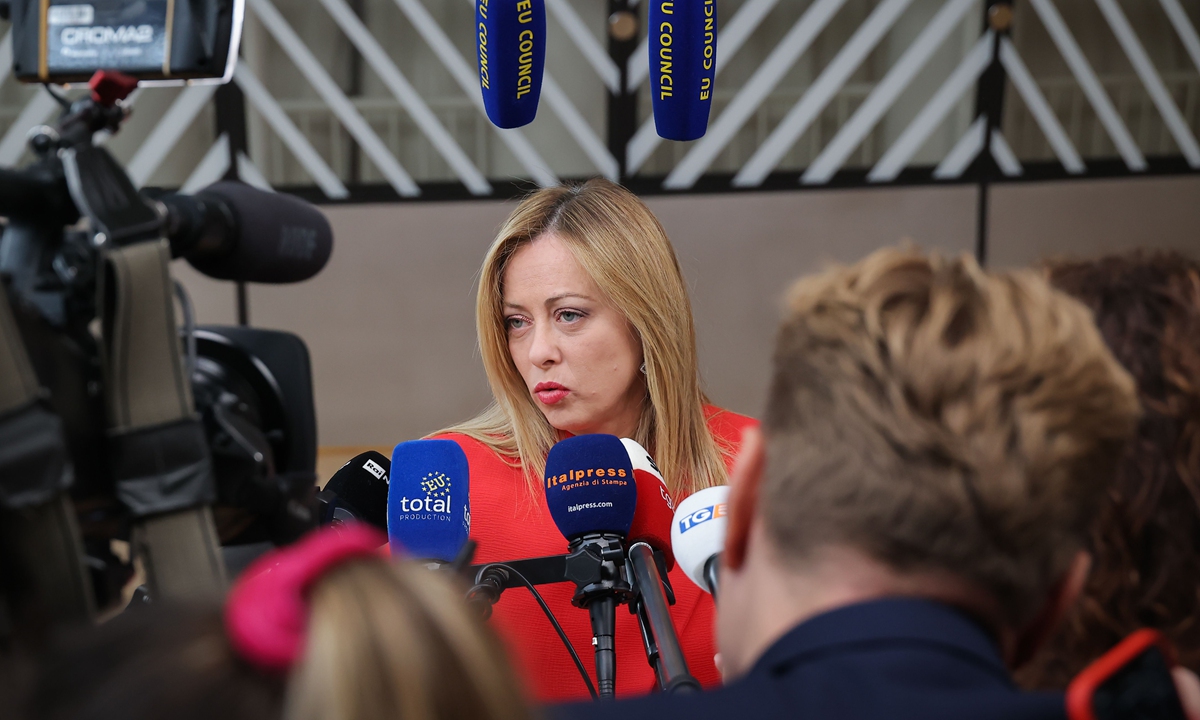
Italian Prime Minister Giorgia Meloni arrives for a summit at EU parliament in Brussels, on February 9, 2023. Meloni told press that French President Emmanuel Macron's decision to invite Ukranian President Volodymyr Zelensky was inappropriate as it undermines European unity. After visiting London and Paris, Zelensky arrived in Brussels on February 9 to push EU leaders for more weapons in the fight against Russia's invasion and also for a quick start to EU membership talks. Photo: VCG
War is likely to engulf the whole of Europe if European countries provide fighter jets to Ukraine, Chinese experts warned, after Ukrainian President Volodymyr Zelensky made a surprise visit to the UK and France to push the case for fighter jets. Such a move will not only trigger a strong response from Russia, but will also drag more countries into the crisis and further escalate the situation, said experts.
In only his second overseas trip since the Russia-Ukraine crisis started nearly a year ago, Zelensky made visits to the UK and France on Wednesday. The Ukrainian president gave a speech to the joint houses of the British parliament in which he made a direct plea for more heavy weaponry, including fighter jets.
Zelensky thanked the British people for their support since "Day One" of the conflict, as Prime Minister Rishi Sunak said fighter jets were "part of the conversation" about aid to Ukraine.
Sunak's spokesman Max Blain said the government was exploring "what jets we may be able to give" over the coming years, but had not made a decision on whether to send its F-35 or Typhoons.
The Russian Embassy in London strongly warned the UK against supplying the warplanes, saying Britain would bear responsibility "for another twist of escalation and the ensuing military-political consequences for the European continent and the entire world."
The sending of fighter jets to Ukraine has long been debated among Western countries. Mykhailo Podolyak, an adviser to Zelensky, said that talks over fighter jets were taking place with allied nations, but some held a "conservative attitude" that he said was "due to fear of changes in the international architecture," Time magazine reported in January.
It is very likely that the UK will set a precedent of flying fighter jets to Ukraine, which will directly change the situation on the battlefield, as it takes time to train Ukrainian pilots how to fly NATO-standard fighter jets, Song Zhongping, a Chinese military expert and TV commentator, told the Global Times. This means it is likely that NATO soldiers will be flying the jets, becoming directly involved in the crisis, he added.
Moreover, those fighter jets are unlikely to be deployed in Ukraine, but will instead be based in countries such as Poland, which means those countries will also be dragged into the conflict, said Song.
When meeting with Zelensky, French president Emmanuel Macron said France hasn't ruled out sending fighter jets, but he set conditions, such as guaranteeing that it will not lead to an escalation of tensions, the aircraft will not be used "to touch Russian soil," and it will not result in weakening "the capacities of the French army."
Song believed that apart from concerns over stirring up the conflict, Western countries are also worried that providing Ukraine with fighter jets will weaken their own air forces. It is likely that those countries will only equip Ukraine with second-hand, outmoded jets such as the Dassault Mirage F1, but keeping F-35s to themselves, according to Song.
At the same time, Russia is also accelerating the pace of developing new weapons. Russia's TASS reported in January that Russia would induct new submarines, warships, and weapons systems in 2023 to bolster its military firepower. Four underwater vehicles and 12 advanced surface ships will reportedly go into service with the Russian armed forces later this year.
Military experts said that the Western squeeze may further pressure Russia to rapidly develop its weapons; moreover, Russian weapons have been tested through an abundance of real combat experience, which will also help them to develop.
Experts also warned that Western countries are now being hijacked by the toxic trend of competing to offer Ukraine weapons and aid in order to vie for influence. "This is especially obvious now in Europe, with countries competing to offer military equipment to Ukraine to demonstrate their diplomatic influence," Zhang Hong, associate research fellow at the Institute of Russian, Eastern European and Central Asian Studies of the Chinese Academy of Social Sciences, told the Global Times.
Despite this urge to compete for influence, Cui Heng, an assistant research fellow from the Center for Russian Studies of East China Normal University, said European countries' hands are tied in how they are able to maneuver over the Russia-Ukraine crisis. Europe has been hijacked morally by the US on this issue, and been pushed to the front line of confrontation with Russia, thus those countries will eventually bow to the US' will.
With the ongoing Russia-Ukraine crisis expected to escalate in the near term, experts warned Europe to maintain its strategic independence and try to assuage tensions rather than add fuel to the fire, otherwise it will open the door of tragedy to the whole of Europe, said Song.




